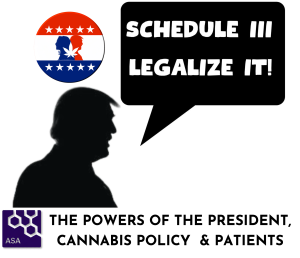DEA Proposal Could Pave the Way for FDA-Approved Cannabis Medications

The US Drug Enforcement Administration (DEA) has proposed new regulations that could significantly change the status of delta-9 THC from the cannabis plant. These rules would reclassify cannabis from a schedule I to a schedule III substance, allowing medications containing delta-9 THC to be eligible for approval by the US Food and Drug Administration (FDA). This shift would recognize cannabis as a regulated medication rather than a narcotic with no accepted medical use.
Despite this potential change, nearly 4 million Americans already use medical cannabis legally at the state level, which conflicts with federal laws. The widespread state-level legalization raises questions about the incentives for pharmaceutical companies to seek FDA approval for cannabis-based drugs.
Igor Grant, director of the Center for Medicinal Cannabis Research at the University of California, San Diego, notes that state legalization has outpaced federal regulation, potentially deterring pharmaceutical investment in cannabis. Jahan Marcu, author of “Cannabis Innovations,” shares this skepticism, suggesting that the established market for hemp and cannabis products makes FDA approval less attractive.
States have long permitted the sale of cannabis outside the federal regulatory system, leading to a market flooded with millions of hemp- and cannabis-based products. This competition makes it challenging for pharmaceutical companies to profit from new FDA-approved cannabis drugs. Grant questions the financial incentive for big pharma to enter this market when cheaper alternatives are available through dispensaries.
Nevertheless, some pharmaceutical companies are exploring medical cannabis. In 2022, Pfizer acquired Arena Pharmaceuticals, which conducts research on medical cannabis. Dr. Peter Grinspoon, a Harvard Medical School instructor and author of “Seeing Through the Smoke,” highlights the complex relationship between pharmaceutical companies and cannabis proponents. Initially, pharmaceutical companies resisted cannabis legalization, fearing competition with home-grown cannabis. However, the financial impact of legalization has led some companies to invest in cannabis ventures.
Developing FDA-approved drugs is costly and time-consuming, often requiring hundreds of millions of dollars and multiple phases of testing. Despite these challenges, Jazz Pharmaceuticals successfully developed Epidiolex, a pure form of CBD approved for rare seizures. Unlike delta-9 THC, CBD is federally legal under the 2018 Farm Bill. Jazz Pharmaceuticals is working to expand Epidiolex’s approval to other countries, potentially increasing profitability.
Marcu suggests that pharmaceutical companies might find more success if they can get cannabis-based drugs approved in multiple countries, especially where cannabis is less accessible. This global approach could make medical cannabis research more lucrative.
If pharmaceutical companies decide that medical cannabis research is not profitable, the plant’s full medical potential may remain unexplored. Grinspoon emphasizes that the FDA approval process is crucial for refining medications and optimizing their effectiveness. Precise formulations of cannabinoids could yield significant medical benefits, offering targeted treatments for various conditions. The collaboration between pharmaceutical companies and medical cannabis research could lead to innovative and effective cannabis-based medications.





